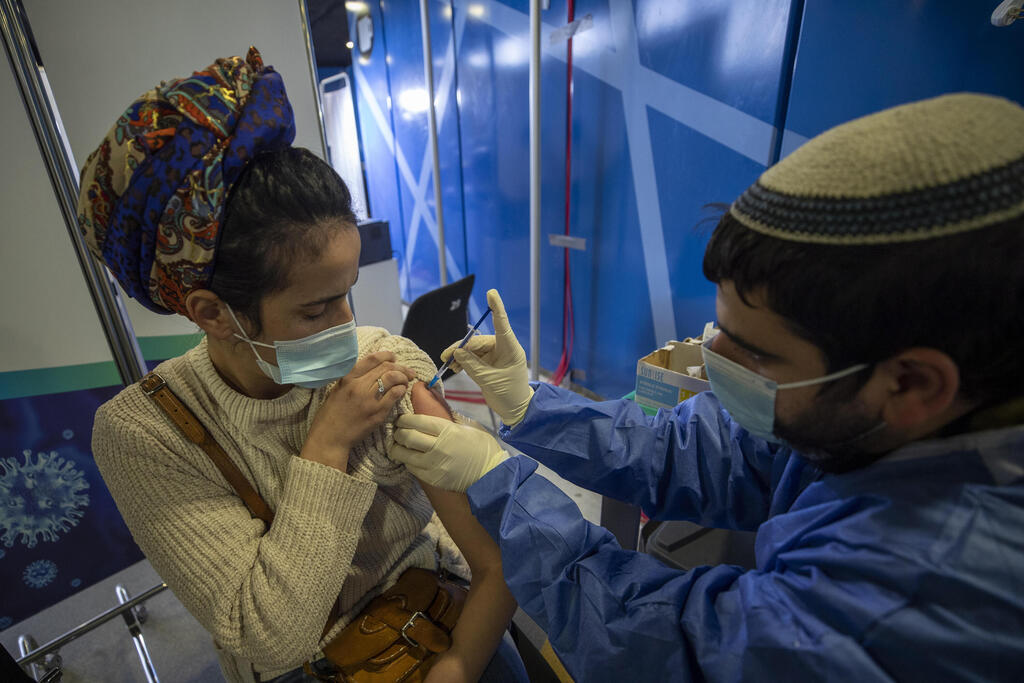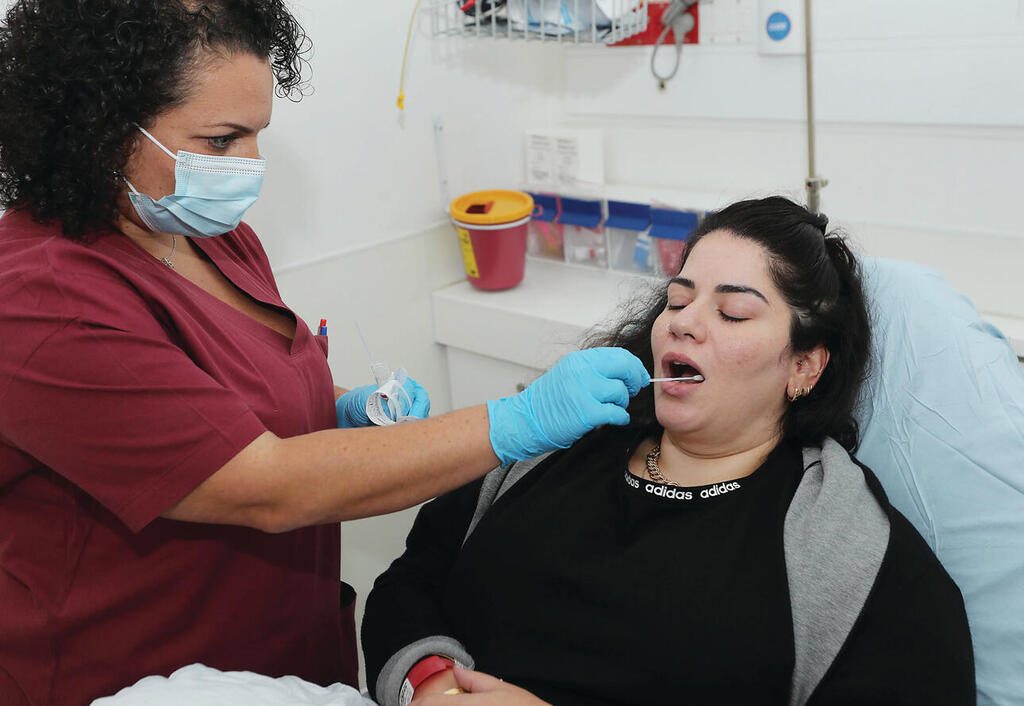Israeli residents took a global lead by receiving the first COVID-19 vaccinations nearly three years ago. Recently, the country reached another significant milestone in the global fight against the pandemic. The world's first report on the worrisome new coronavirus variant, BA.2.86, nicknamed "Pirola," was unveiled just two weeks ago. This variant contains numerous previously unseen mutations and was disclosed by the Health Ministry lab in Sheba Medical Center.
Read more:
The patient from whom the sample was obtained, an elderly person who was hospitalized and did not leave the country, became the first person in the world to be identified as carrying this variant. Within a few hours, additional reports began to emerge from around the world. "There was great excitement, and we were asked for many details," said Dr. Netta Zuckerman, the director of the Center for Bioinformatics and Genomics at the Central Virology Laboratory. "Naturally, we accommodated everyone."
In the coming days, this virus, identified by Dr. Shay Fleishon from the Health Intelligence System, the body established a year ago in the Ministry of Health to provide early warning of various public health risks, became a global concern. Dozens of additional cases were reported around the world. According to estimates, many people, unbeknownst to them, may already be carrying it.
According to Dr. Zuckerman, the significance of the new variant and the level of concern it warrants remain uncertain. She explains, "It is too early to make a definitive statement. We are actively monitoring every instance in collaboration with the health intelligence experts at the Ministry of Health. However, due to the limited number of identified cases worldwide, it is challenging to predict its trajectory at this point."
It appears that there is a resurgence of COVID-19 infections among those around us. Even Jill Biden, the First Lady of the United States, who fell ill last Tuesday, shared that her husband has tested negative for any additional infection at this time. Similarly, R' (name withheld) recently made a surprising discovery that he has contracted the virus for the third time.
"I have received the vaccine three times and have previously been infected twice," he explains. "Therefore, when I started feeling unwell, I didn't immediately seek a test, assuming it was just a mild cold. However, as my temperature soared close to 104 degrees and I experienced intense headaches, the doctor at the HMO clinic advised me to undergo lab testing. After enduring two challenging days of extreme discomfort, feeling as if I was completely bedridden, I received a positive result: I have tested positive for COVID-19 once again."
The situation has drastically escalated. Based on information from the Ministry of Health, there has been a significant surge in daily confirmed cases, with a 30% increase over the past two weeks of August. Additionally, the number of severe patients requiring hospitalization has doubled in the last month, rising from 25 to 50. This week, the positivity rate reached almost 17%, suggesting a high prevalence of undetected infections. Moreover, the number of official tests conducted remains very low, indicating that the actual number of cases is likely much higher. The exact extent of the increase remains uncertain.
"Without a doubt, we're going through a wave, mainly seen in the community," says Prof. Gili Regev-Yohai, director of a pandemic research institute. "We have not yet seen an increase in severe patients, but I am receiving reports from the periphery and some from Jerusalem about an increase in such patients, who all have risk factors."
Dr. Sharon Elrai-Price, the head of the Public Health Division at the Ministry of Health and the one who led the national policy throughout most of the pandemic confirms COVID-19 has made an unwelcome comeback. "For the past two months, there have been more and more cases," says Elrai-Price.
"It is clear to us the knowledge we have today about the scope of the infection after the home isolation order was lifted and people are being tested at home rather than through official testing, is inaccurate. Thus, we continue to closely monitor hospitalized patients with COVID-19, and even in this measure, we are seeing an increase from 150 about two months ago to between 200 and 250 today."
A different beast
The global data presents a similar scenario. Recent reports indicate that the number of COVID-19-related visits to emergency rooms in the US has reached its highest point since last January and continues to climb. This week, there have been over 230,000 new cases reported, marking a 25% increase from the previous week and the highest number since March.
Additionally, there is a noticeable rise in the number of deaths. Estimates suggest that within a week, the US could be witnessing approximately one million new infections daily, leading to tens of thousands to hundreds of thousands of new cases of long-COVID each day. The situation in Europe and Asia mirrors this trend.
The current variant landscape leading to infections in Israel is characterized by a wide range of types, with numerous variants being identified. The most dominant variant at present is EG.6.1, accounting for approximately 20% of the infections, followed by EG.5.1.1 and EG.5.1. Another variant, Aris, is also spreading rapidly. These variants are distant descendants of Omicron, the virus that caused widespread infection throughout the country in early 2022.
Contrary to previous waves caused by a single dominant variant, such as Delta and Omicron, there is currently a mosaic of variants that contribute to the illness," says Dr. Elrai Price. "In the world, there are currently five to six leading variants. In Israel, the leading variant is responsible for only 20% of the cases, indicating the variants are slightly more transmissible and population immunity is also declining."
The Pirola variant is concerning because it is genetically very different from its predecessors, but for now, there's no evidence to suggest it triggers severe symptoms," says Elrai Price, quickly adding, "This whole thing is still being investigated, so it needs to be approached with great caution, but so far, those who have been infected with it are older individuals who did not require ICU treatment after infection."
The conundrum currently troubling the scientific community is whether the new vaccines, designed against a specific strain of the virus and set to arrive in the market in the US next week, will be effective against the new variants at all. Early laboratory experiments by Moderna, published on Wednesday, show that the updated booster generates a nine-fold increase in neutralizing antibodies against Pirola. Similar information is expected to be published by Pfizer as well. Previous publications have shown that the new vaccine also provides good protection against the Aris variant.
4 View gallery


An Israeli woman is vaccinated against COVID-19 at a Jerusalem medical center, Feb. 23, 2021
(Photo: EPA)
The vaccines, which are based on an earlier variant of the virus, will first need to clear FDA approval and then receive the recommendation of the independent expert committee of the CDC, the Centers for Disease Control and Prevention, which is expected to convene on September 12th. Most experts agree the vaccines will primarily be recommended for high-risk groups, including chronically ill patients, adults aged 65 and older, and immunocompromised individuals.
Should we go back to putting on masks?
Not right away, Dr. Elrai Price clarifies. "It is important to understand that COVID-19 is not going anywhere," she says. "There will still be fluctuations in the number of cases. COVID-19 is not the flu; there are still significant changes in this virus, so we continue to approach it with utmost caution.
"However, the majority of the population is protected due to vaccinations and previous infections. Those who feel unwell should stay at home, and those who test positive for COVID-19 should be even more careful. Those who want to reduce the risk of infection can use masks, and once the vaccines become available at the end of this month or the beginning of next month, people will be able to get vaccinated at clinics. We are not imposing, we are recommending."
First published: 20:51, 09.10.23




